December 7, 2022 - No. 56
Legault Government's Anti-Social Restructuring of Health Care
False Claims that Privatization Complements Public Health Care
First Ministers Meeting on Health Care
• Health Care Funding Brouhaha
Legault Government's Anti-Social Restructuring of Health Care
False Claims
that Privatization Complements
Public Health Care
The present crisis in health care is the result of several decades of the neo-liberal anti-social offensive. One of its characteristics is to deny society's responsibility to its members and the role of government as defender of the public good. The situation requires a redefinition of what is the public sphere. The simple fact that the notion of public is associated with a "sector" -- the other being private -- is in itself a problem. A redefinition of what is public is the order of the day, by those directly involved — health workers, all workers and the population as a whole.
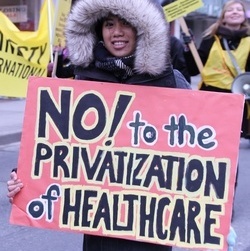 Privatization, such as the
building of mini-hospitals recently
announced by the Quebec government, is presented as being
complementary
to public health institutions, with the aim of "reducing
emergency ward
overcrowding," and "shortening the waiting lists." In 2018, the
president of the Quebec
Chambers of Commerce, in an article entitled "The private
sector, a
partner to the public and universal health system," speaks of
the
unending waiting lists, "in spite of the billions of dollars of
investments given by the Treasury over the years." This
statement in
itself is part of the false
claims that the public system is not effective. He does not even
take
into account that just three years prior to this, the Quebec
government
cut back millions of dollars in health care with its
centralizing
reform, from which the system has never recovered. He speaks of
a
"close and clearly
advantageous collaboration" which, according to him, has evolved
between the public sector and private enterprises, and states
that it
would be a misinterpretation of the spirit of the Canada
Health Act to see such complementary services as a
violation of the principle of universal health
care.
Privatization, such as the
building of mini-hospitals recently
announced by the Quebec government, is presented as being
complementary
to public health institutions, with the aim of "reducing
emergency ward
overcrowding," and "shortening the waiting lists." In 2018, the
president of the Quebec
Chambers of Commerce, in an article entitled "The private
sector, a
partner to the public and universal health system," speaks of
the
unending waiting lists, "in spite of the billions of dollars of
investments given by the Treasury over the years." This
statement in
itself is part of the false
claims that the public system is not effective. He does not even
take
into account that just three years prior to this, the Quebec
government
cut back millions of dollars in health care with its
centralizing
reform, from which the system has never recovered. He speaks of
a
"close and clearly
advantageous collaboration" which, according to him, has evolved
between the public sector and private enterprises, and states
that it
would be a misinterpretation of the spirit of the Canada
Health Act to see such complementary services as a
violation of the principle of universal health
care.
Quebec Premier François Legault made similar statements when he announced his new mini-hospitals project. After having stated that the question of privatizing the supply of health care was a "touchy subject for Quebec," he added that one should not speak of privatization as if one were speaking of the devil. Such demonization is resorted to by governments when workers demand wages and working conditions acceptable to themselves for the work they do. This is precisely what Doug Ford did when he responded to the demands of Ontario education workers by declaring that they were demanding money which is supposed to go to schools, health care, public transit and infrastructure, "vital services hardworking people of the province are counting on."
In an open letter dated September 22, speaking on behalf of the Board of Quebec physicians for a public system, resident physician doctor Élise Girouard-Chantal points out: "Let us not be fooled: the immediate aim of private companies is profit, even in health." She explains that the financing of the Groups of family medicine (GMF) is public but the management is private. She says that this financial arrangement is more costly to the state, since doctors who practice in these centres receive, for each service, a fee which is 35 per cent higher to cover the operating costs of private management. A significant proportion of GMF's are made up of corporations making substantial profits at the expense of tax-paying Quebeckers, she says.
She also points out that privatization schemes such as those put forward by the CAQ deprive the public system of its capacity to tend to patients. To illustrate this, she says, we just have to look at private hiring agencies, which were very active during the pandemic. The workers with these agencies were themselves public health care workers who left the system to be rehired by agencies, then are sometimes assigned to the same hospital they used to work in. For the same worker, the government pays more because the agencies pocket a generous profit.
Dr. Girouard-Chantal adds that privatization is often presented as a miracle solution for providing better care and reducing waiting lists. In fact, data shows that a private parallel system does not ease the public burden and can in fact make waiting lists even longer. In long-term care, studies have shown that private institutions provide lower quality of care, and have a higher death rate. The myth of the superiority of private management in Quebec was completely shattered during the pandemic in private homes for seniors.
Some of the recommendations she puts forward are very similar to those of the Quebec Federation of Nurses and other unions: improve nurses' working conditions by abolishing mandatory overtime, pass legislation to establish safe staff to patient ratios, block contracting-out to private manpower agencies, block for-profit GMF's, private medical centers managed by private investors as well as public-private partnerships.
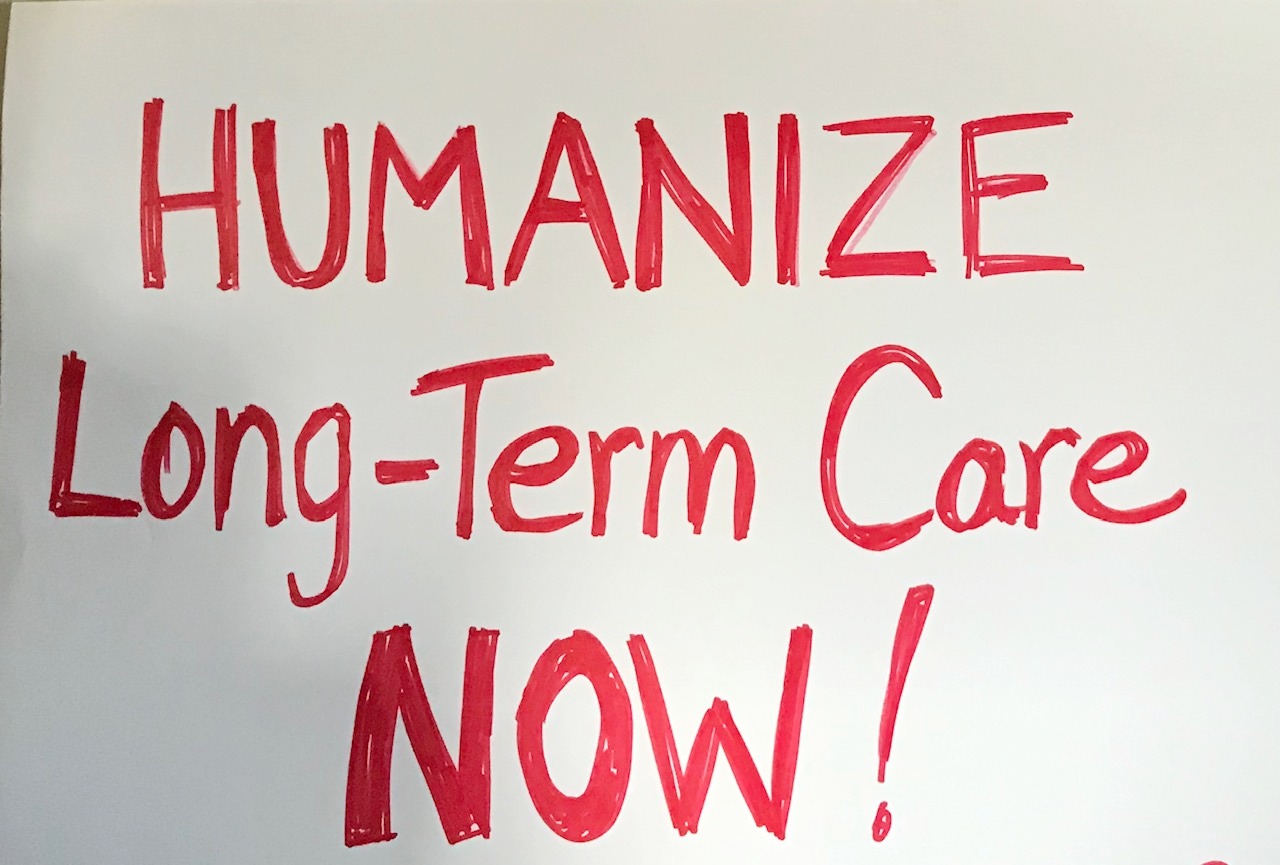 In the case of private CHLSD's
(long-term care homes) and seniors'
homes, numerous reports -- including the one by the Quebec
Coroner
Géhane Kamel on the death of older or vulnerable persons in
these homes
during the first wave of the COVID-19 pandemic -- have denounced
the
handing over of
the health of our seniors to private institutions whose aim is
to make
money on the backs of the elderly. The number of cases was
overwhelming
and showed that these homes are not properly equipped in human
and
material resources to care for illnesses and problems frequently
experienced by the
elderly, nor to take basic epidemiologic measures, let alone to
face a
pandemic.
In the case of private CHLSD's
(long-term care homes) and seniors'
homes, numerous reports -- including the one by the Quebec
Coroner
Géhane Kamel on the death of older or vulnerable persons in
these homes
during the first wave of the COVID-19 pandemic -- have denounced
the
handing over of
the health of our seniors to private institutions whose aim is
to make
money on the backs of the elderly. The number of cases was
overwhelming
and showed that these homes are not properly equipped in human
and
material resources to care for illnesses and problems frequently
experienced by the
elderly, nor to take basic epidemiologic measures, let alone to
face a
pandemic.
Some families whose loved-ones were victims of these tragedies are still going to court to obtain justice. The most recent is a civil lawsuit by two families claiming damages from the Quebec government for the alleged abuse of their parents during the COVID-19 pandemic. A member of one of the families has pointed out that it is important that justice prevail, our elderly having been sacrificed, and hoped that a ruling in favour of the families would force the government to improve care for the elderly and make sure such a tragedy never happens again. The families fear that the report by Coroner Géhane Kamel on the deaths in long-term care homes will be forgotten and ask themselves why, during the electoral campaign, parties did not talk about the catastrophic situation in the CHSLD's, stating that we cannot pretend that it does not exist.
In her report, the Coroner stated that the tragedy in the CHLSD'S reflects a " breach of the moral and societal contract." These words are actually a good description of the present overall situation since for several decades we have witnessed a definite breach of the civil society moral and societal contract. The very notion of society and the responsibility of governments as defenders of the well-being of the population is a thing of the past. In the face of the dismantling of the public health care system which leaves many behind, and in the face of devastating attacks on our physical and mental well-being, who but the public themselves -- made up of health workers and of workers and the population as a whole -- are in a position to defend the care needed by the population and which belongs to it by right? Who else can put its collective strength into play and rally everyone around a public health program whose content is clearly emerging and has, as a top priority, the improvement of the working conditions of those who deliver the care as well as of the protection of their health and security?
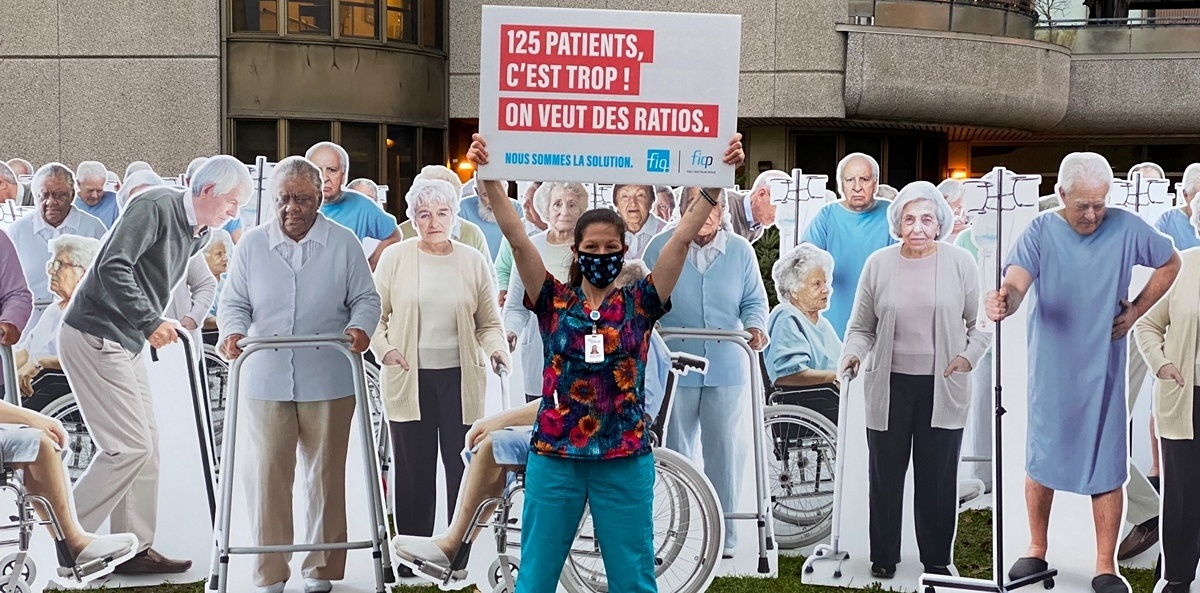
First Ministers Meeting on Health Care
Health Care Funding Brouhaha
The state of the health care system is a major matter of concern for Canadians and Quebeckers. Talks in early November between the federal government and Quebec and the provinces dealing with health care funding ended in disarray. Each level of government was trying to play one-upmanship with the health care system to avoid raising the need for a new direction for the economy and the reform of the health care system so that it meets the needs of the people and society. The premiers blamed the Trudeau government for the impasse while the Liberal party in power blamed the premiers for giving their negotiators "marching orders" to stop negotiating.
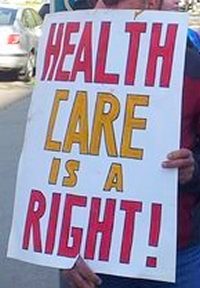 Rather than
deal with the
necessity for a new direction in the health care system and
solve
problems as they present themselves, the political leaders
showed they
have something else in mind. None of them has the courage to
break away
from the grip of the global private interests that control the
health
care industry and
solve the basic issue of how to concretize and bring into being
the
right of all to health care.
Rather than
deal with the
necessity for a new direction in the health care system and
solve
problems as they present themselves, the political leaders
showed they
have something else in mind. None of them has the courage to
break away
from the grip of the global private interests that control the
health
care industry and
solve the basic issue of how to concretize and bring into being
the
right of all to health care.
The premiers engaged in petty squabbles, putting on a grand show that somehow they are the ones who should be in charge. In this way they seek to divert public opinion away from concretizing the right of all to healthcare.
Meanwhile, one after another those who call themselves leaders engage in real attacks on health care workers and refuse to increase investments in social programs. Ontario and Quebec seek to dictate the terms of employment of health care workers and increasingly drag down the entire industry into the anti-social mire of private profit. Their so-called solutions entail attacking the people who do the work and handing over the social value those workers create to global private enterprise. These are not solutions at all but simply twists of the same-old same-old schemes of paying the rich and exploiting the working class. The health industry and the entire economy demand a new pro-social direction to serve the people that takes into consideration its modern social nature and the central role and rights of working people in all affairs.
BC Health Minister Adrian Dix, who co-chaired the second day of the gathering on November 3 along with federal Minister Jean-Yves Duclos, said the federal government withdrew in a huff from a joint statement on the talks and excluded itself from a news conference.
The Canadian Press writes, "The premiers said they were disappointed with the lack of a federal response to an ongoing request from provinces and territories to get 35 per cent of health care costs covered by Ottawa, up from 22 per cent.
"Duclos declined to say whether the federal government 'came to the table with more cash' and instead accused the premiers of not wanting their health ministers to accept any conditions, like providing data on the health-care workforce.
"'Unfortunately, despite (Monday's) gesture of good faith, provincial and territorial colleagues, our colleagues, have received marching orders by their premiers not to make further progress,' Duclos said pointedly. 'As a result, the premiers are preventing all of us health ministers from taking concrete and tangible steps that would make an immediate difference in the daily lives of health workers and patients.'"
Canadian Press writes further, "The Canadian Federation of Nurses Unions and the Canadian Nurses Association said the lack of results along with 'finger-pointing' is not what they expected from the meetings. 'Nurses from across Canada are burnt out and under severe stress, while facing unprecedented pressures that have pushed them past the breaking point,' the two groups said in a joint statement.
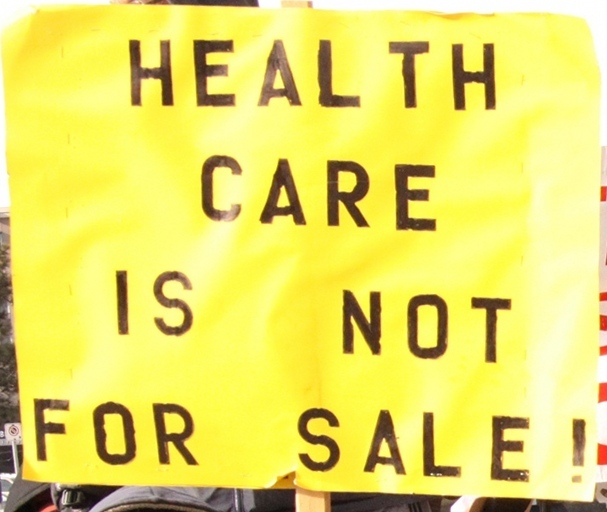
"Trudeau decried provincial tax breaks for the wealthy that he described as 'trickle-down economics' while provinces -- most of which are currently led by Conservative premiers -- beg for more federal cash for health care.
"Throwing money into a 'broken system' isn't the answer, Trudeau said. 'If provinces continue to not reform or not improve their health care delivery services, it's no surprise that Canadians are getting more and more frustrated,' he said. 'Yes, the federal government will be there with more money, but we also know the provinces have a lot of money that they could be investing in health care as well.'
"All 13 of Canada's premiers have been demanding a $28-billion increase to the Canada Health Transfer, which they say will bring the federal contribution toward health costs from 22 per cent currently to 35 per cent."
Dispute Over Funding
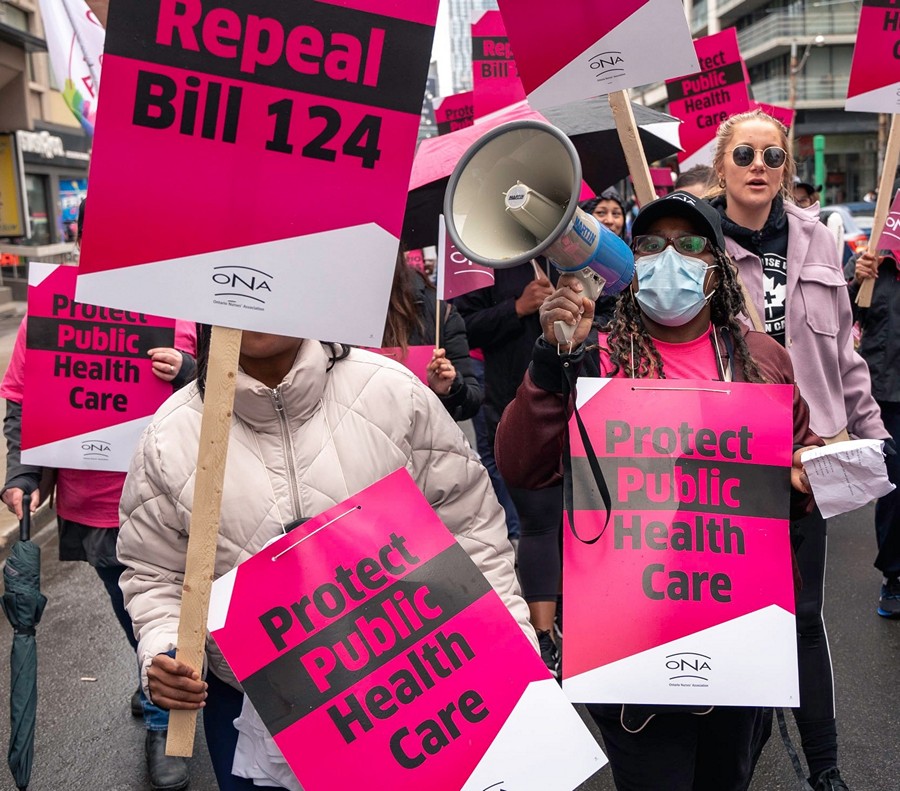 Modern health care is a vast
interlocking system of disciplines
encompassing the production and use of buildings, hospital
supplies and
pharmaceuticals and employing the capacity to work of educated
workers.
The system produces healthy workers adding immense social value
to
their capacity to work
and to the economy and society.
Modern health care is a vast
interlocking system of disciplines
encompassing the production and use of buildings, hospital
supplies and
pharmaceuticals and employing the capacity to work of educated
workers.
The system produces healthy workers adding immense social value
to
their capacity to work
and to the economy and society.
The health care funding dispute between ruling factions of the elite raises serious questions about the direction of the health care system including who should be in control, how it should be run and what role the sector plays in the economic system, which includes how the value health care workers create should be realized and distributed.
The dispute over funding detracts from the main issue of realizing the right of all to health care and bringing the organization of the system into conformity with its modern social reality. The inability of the ruling elite to reform the system and solve its problems brings into question the current aim of the system, which is not to guarantee the right to all to health care but to squeeze maximum private profit from it for a few. The political leaders hide behind a curtain of concern over its failures and how much funds should be raised from the public treasury to pay for it. This concern obscures and denies the fact that the system and its workforce produce enormous value for the economy and society but this value is going to enrich a few rather than being put back into the health care system and its workforce.
 The unseemly dispute over funding
ignores or disguises the fact that
the system itself and its thousands of workers produce new
value, which
should be poured back into the industry including into wages and
working conditions at a level demanded by those who do the work
and
know from their
experience and the material conditions what the health care
system
needs. Instead, much of the value they produce is being
plundered by
private interests and taken out of the health care system.
The unseemly dispute over funding
ignores or disguises the fact that
the system itself and its thousands of workers produce new
value, which
should be poured back into the industry including into wages and
working conditions at a level demanded by those who do the work
and
know from their
experience and the material conditions what the health care
system
needs. Instead, much of the value they produce is being
plundered by
private interests and taken out of the health care system.
The more the health care industry became useful in providing healthy workers for the big employers the more it has become a source of private profit. The health care ox is being skinned for the profit its workers create and for the product they produce -- healthy workers. Those in control and ownership make stupendous profits from their private control of constructing and maintaining its buildings, supplying its material goods such as hospital supplies and pharmaceuticals. In addition, big businesses that employ healthy workers and expropriate the added-value they produce pay little or nothing for the social value embedded in the capacity to work of their employees.
Funding health care from tax revenue is an aspect of how the ruling elite sustain their grip over the outmoded aim to pay the rich, block the economy from being modernized and deprive workers from establishing themselves as human beings with the right to decide and control all those affairs that affect their lives. Caught in the rut of the old, the economy produces healthy workers as things at little cost to those who buy their capacity to work. The grip of the old impedes the economy from moving forward to fulfil the right of all to health care and sustain a viable health care system without constant crises.
Rather than face the reality that a new direction is required, the ruling elite launch attacks on those who do the work and manipulate the system to channel social wealth into the pockets of the rich. This direction is becoming more difficult to sustain, which is yet another reason why those in control and their political system have degenerated into police powers to enforce their dictate and divert public funds into projects to pay the rich and prepare and engage in war.
The direction of the leaders brings into question who should be in control of the health care system. Should it not be the workers themselves, who can elect from among their own ranks those who should be in control and work out among themselves what the material conditions reveal in terms of what the wages should be and what investments the system requires to fulfil the aim of guaranteeing the right of all to health care at the highest level?
Instead the system is now burdened with political leaders and bureaucrats who are consumed with the outmoded aim of expropriating private profit from the economy. As well, the ruling elite have cultivated a middle strata of doctors to act as enforcers of this outmoded system through their dual hat of doctoring and running a private practice or business. Instead of participating as equals with other health care workers and dedicating their skills and education to fulfilling the right of all to health care and improving the system, many of them parade around as businesspeople running either their own enterprise or a franchise of a monopoly dedicated to expropriating private profit. Their condition of businessperson and employer puts them at odds with their duty as doctor and in contradiction with those they employ and with those they treat who are viewed as customers.
In addition to the problem of private enterprise corrupting the health care system, the realization of the product -- social value embedded in healthy workers -- is done insufficiently and indirectly through public taxation rather than from direct payment by the enterprises that employ workers in return for the use of their capacity to work. Indirect realization of social health care value through government taxation obscures the reality of who benefits from the social value of healthy workers in an economic sense under the imperialist system, which is the employer, who should pay directly for the social value they receive and use.
The social value of the capacity to work that employers use and consume remains obscure and not directly realized yet they benefit from the value that the capacity to work they buy and employ produces. Funding the system from taxation, insurance and individual payment allows the ruling elite to manipulate public opinion and divert attention away from the necessity for a new direction based on the modern socialized conditions.
As long as the commodity system of exchange remains the focal point of the economic system, the individual and social value of workers' capacity to work must be realized in full directly by those who employ and buy that capacity to work and expropriate the new value it produces. As a matter of being engaged in the socialized economic system, all enterprises employing more than twenty workers must pay directly a pro-rated amount of the social value of the capacity to work of those they employ, which mainly is comprised of health care and education social value. The pro-rated amount would be calculated both from the number of workers an enterprise employs and its gross income, and must be sufficient when combined together with other enterprises to realize the social value of the entire nation and constantly increase investments in social programs and improve their quality.
(To access articles individually click on the black headline.)
Website: www.cpcml.ca Email: editor@cpcml.ca



